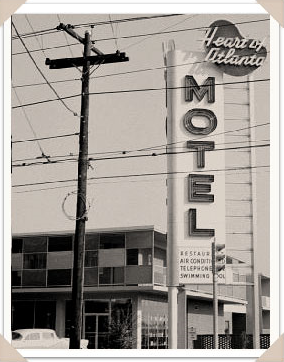
Title II of the Civil Rights Act of 1964 forbade racial discrimination in hotels, motels, restaurants, theaters, and all other public  accommodation engaged in interstate commerce. Heart of Atlanta Motel, a large 216-room motel in Atlanta, Georgia, refused to accept black patrons.
accommodation engaged in interstate commerce. Heart of Atlanta Motel, a large 216-room motel in Atlanta, Georgia, refused to accept black patrons.
The owners of the Heart of Atlanta Motel challenged Title II of the Civil Rights Act of 1964 by filing suit against the government in federal court arguing that by passing the Act, Congress exceeded its Commerce Clause powers to regulate interstate commerce. The owners also argued that the Act violated their Fifth Amendment rights by depriving them of the right to choose their customers and operate their business according to their desires. Lastly, the owners argued that the Act violated their Thirteenth Amendment rights by placing them in a position of involuntary servitude by forcing them to rent available rooms to blacks.
Attorneys for the United States responded to Heart of Atlanta Motel's allegations noting that restrictions in public accommodations for black Americans severely interfered with interstate travel, and accordingly it was within Congress's power under the Commerce Clause to regulate such matters. Further, they argued that the Fifth Amendment does not forbid reasonable regulation of interstate commerce. The government also argued that as the Thirteenth Amendment applied primarily to slavery and the removal of disabilities associated with slavery, it did not apply in the current case.
In a decision authored by Justice Clark, the Court held that Congress acted well within its jurisdiction of the Interstate Commerce Clause in passing the Civil Rights Act of 1964. The Court noted that the applicability of Title II was "carefully limited to enterprises having a direct and substantial relation to the interstate flow of goods and people. . ." As 75% of the Heart of Atlanta Motel's clientele came from out of state, and it was strategically located near Interstates 75 and 85 as well as two major U.S. highways, the Court found that the business clearly affected interstate commerce. The Court concluded that places of public accommodation had no "right" to select guests as they saw fit, free from governmental regulation.
View Case: Heart of Atlanta Motel v. United States, 379 U.S. 241 (1964)

